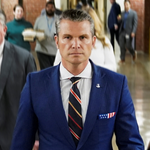
Fred Thompson as Wilford BrimleyPhoto: Getty Images
The first night of the Republican convention had scattered compelling moments and one great speaker, but as spectacle, it fell flat.
Much of the early evening was taken up with prepackaged videos. “Country First,” a filmed roll call of American icons narrated by Robert Duvall, kicked things off, and was marred only by the response of the delegates, who cheered wildly when images of Nancy Reagan and George W. Bush appeared but were silent for Rosa Parks and Martin Luther King Jr. Then came tributes to everyone from Abraham Lincoln to George H.W. Bush (though “Deceased Republican Leaders and President Ford” were handled earlier in the day). The best one was on Ronald Reagan, which remembered that he had been called a “California nutcase” — good for Republicans that they’re willing to put Reagan forward as the controversial conservative he was, rather than the genial paterfamilias he’s been remembered as for the past couple of years. The one that should have been moved into prime time was on Teddy Roosevelt; while it’s hard to see John McCain as the next Lincoln, T.R. is a role model the GOP could put forward more plausibly.
President Bush spoke by satellite before prime time, and what a mess. Bush knows better than anyone how ineffective remote appearances are, having nuked McCain in a critical 2000 debate when McCain showed up via video screen. But apparently he just couldn’t be seen leaving Washington for political purposes, even though Hurricane Gustav had been downgraded to a category-1 storm long before his speech. As a result, Bush spoke stiffly, stepping over various applause lines. His blenderized words didn’t help. “Surge … understands the lessons of September 11, 2001 … rather lose an election than see his country lose a war” — honestly, after a while, Bush speeches come to sound like the adults going “blah blah blah” in Peanuts cartoons. And Bush went out of his way to avoid doing the one thing a president with an approval rating in the twenties could to help his party’s nominee: He refused to acknowledge specific instances where he was wrong and McCain was right. Nobody thinks Bush and McCain even like each other. But all we got from Bush was, “He’s not afraid to tell you when he disagrees — believe me, I know.” That was weak. And since Bush spilled over into the 10:00 hour, the networks carried what he was saying.
Fred Thompson’s speech contained most of the night’s high points. Thompson went into Wilford Brimley mode for a folksy defense of Sarah Palin. In a series of straightforward, often one-sentence paragraphs, he sketched McCain’s rebellious but honor-bound biography, even including the fact that McCain once dated a stripper named “Marie, the Flame of Florida.” And without naming Barack Obama once, Thompson skewered him as “the most liberal, most inexperienced nominee to ever run for president.” It all had the graceful feel of the baseball-metaphor-laden video Thompson narrated to introduce Bush at the 2004 convention, his rich voice stitching together his subject’s best qualities. Thompson’s speech was so good that the mainstream media apparently is going to let him get away with portraying Obama as a supporter of infanticide: “We need a president,” Thompson said last night, “who doesn’t think that the protection of the unborn or a newly born baby is above his pay grade.”
And then Joe Lieberman strode to the stage. Lieberman has the manner of a Borscht Belt comic, not so much in his timing as in his redoubtedness — nobody knocks Joe off his cheerful stride. His ability to deliver a serious line, then a joke, then chuckle whether or not anyone else finds it funny is very effective when Lieberman courts small groups of voters — he charms the hell out of nursing homes. But in larger settings, he often comes across as strained. And when he’s sanctimonious, too, well, you’d rather be doing dishes than listening. When Lieberman lectures, as he did last night, that “it shouldn’t take a natural disaster to teach us that the American people don’t care much if you have an ‘R’ or a ‘D’ after your name,” he’s annoying to both ‘R’ delegates and listeners frustrated with the Bush administration’s hyperpartisan incompetence.
Of course, Lieberman’s very presence in St. Paul just eight years after he ran for vice-president as a Democrat is a triumph for the GOP. We’re not going to see Dick Cheney at a Democratic convention in 2016. Also, he got off one great shot: “Senator Obama is a gifted, eloquent young man who can do great things for our country in the years ahead. But eloquence is no substitute for a record.” Whereas Fred Thompson came ready to play Ronald Reagan last night, Lieberman didn’t come ready to play Zell Miller. Calling for bipartisanship is no way to rouse convention delegates, and the Republicans’ biggest problem this morning is the same as it was before last night: low energy.





























